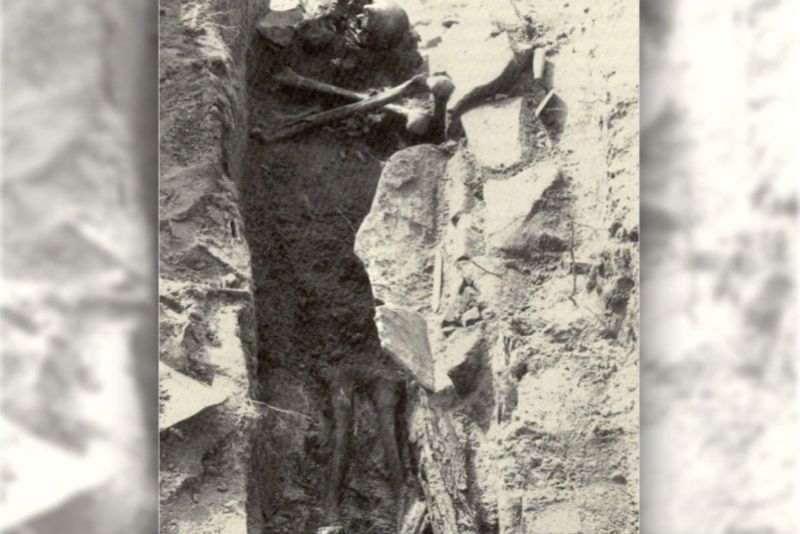
Enlarge / The 19th century grave of "JB55" in Griswold, Connecticut, showing the remains arranged in a manner to prevent the "vampire" from rising and "feeding" off the community. The man is likely local laborer John Barber. (credit: Connecticut Office of State Archaeology)
Back in 1990, children playing near a gravel pit in Griswold, Connecticut, stumbled across a pair of skulls that had broken free of their graves in a 19th century unmarked cemetery. Subsequent excavation revealed 27 graves—including that of a middle-aged man identified only by the initials "JB55," spelled out in brass tacks on his coffin. Unlike the other burials, his skull and femurs were neatly arranged in the shape of a skull and crossbones, leading archaeologists to conclude that the man had been a suspected "vampire" by his community. Scientists finally found a likely identification for JB55, describing their findings in a paper published this summer in the journal Genes.
Analysis of JB55's bones back in the 1990s indicated the man had been a middle-aged laborer, around 55 when he died (hence, JB55, the man's initials and age at death). The remains also showed signs of lesions on the ribs, so JB55 suffered from a chronic lung condition—most likely tuberculosis, known at the time as consumption. It was frequently lethal in the 1800s, due to the lack of antibiotics, and symptoms included a bloody cough, jaundice (pale, yellowed skin), red and swollen eyes, and a general appearance of "wasting away." The infection frequently spread to family members. So perhaps it's not surprising that local folklore suspected some victims of being vampires, rising from the grave to sicken the community they left behind.
Hence the outbreak of the so-called Great New England Vampire Panic in the 19th century across Rhode Island, Vermont, and eastern Connecticut. It was common for families to dig up the bodies of those who had died from consumption to look for signs of vampirism, a practice known as "therapeutic exhumation." If there was liquid blood in the organs (especially the heart), a bloated abdomen, or if the corpse seemed relatively fresh, this was viewed as evidence of vampirism. In such cases, the organs would be removed and burned, the head sometimes decapitated, and the body reburied. Given JB55's lung condition and the fact that the signs of decapitation, he was likely a suspected vampire.
Read 7 remaining paragraphs | Comments

No comments:
Post a Comment